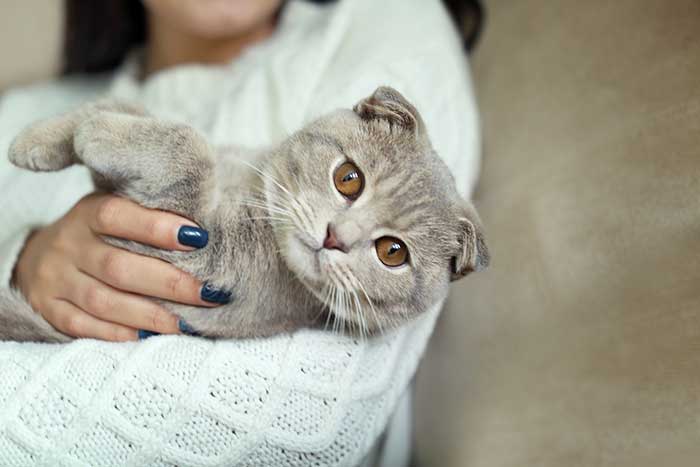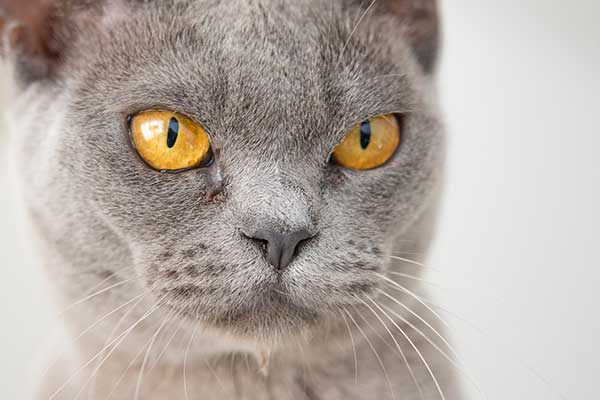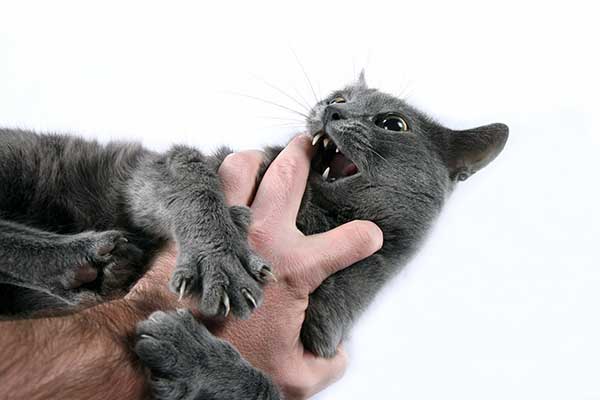You’ve just come home from work. As you walk into the house, your cat lunges at you, wraps its paws around your legs and even goes as far as sink its fangs into your skin.
It happens on the first day and you think, “maybe my cat is just happy to see me.” The same incident repeats itself a week later, then it becomes part of your cat’s routine.
You still console yourself that it’s probably a coincidence. You might even bring yourself to believe that the cat has probably mimicked the behavior from your dog.
However, there are striking differences between how your pooch normally welcomes you at home and how your feline friend does it.
Usually, your dog doesn’t get this rough. It doesn’t bark at you anxiously, neither does it paw at or bite you. So, there’s obviously something off about how your feline friend welcomes you.
In fact, “welcome” isn’t even the most appropriate word to describe these incidences. Because if you look at it rationally, your cat is actually attacking you as opposed to welcoming you home. And as you shall find out, the attacks don’t just happen when you come back home.
The cat might also attack you randomly as you’re busy watching the television or even while the two of you are cuddling together. As a loving and responsible pet parent, these disturbing behaviors by your kitto may get you wondering, why does my cat attack me and no one else?
Now, the reasons why cats tend to attack their owners are diverse, ranging from anxiety to fear, frustration, to mention but a few. Usually, the behavior is triggered or exacerbated by a neurological, mental, or psychological condition.
It could also be due to communication breakdown between you and your feline friend, which usually happens in your daily interactions with the cat, especially during playtime.
Read on as we expound further on why your cat might be attacking you and no one else, and what you can do to prevent or redirect this aberrant behavior.
Table of Contents
Why Does Your Cat Attack Only You And No One Else? Here Are Some Possible Reasons
One of the common concerns that many vets usually get from cat owners is, “my cat attacks me and no one else, what are the causes of this behavior and should I be worried?”
Right off the bat, let’s reiterate that cat attacks aren’t to be taken lightly. Besides their potential to constrain the relationship that exists between you and your cat, these attacks can also inflict some serious wounds on you. We’ll highlight that later on.
First, let’s examine the possible reasons why your feline friend might be attacking you and no one else.

1. Fear and Anxiety
According to experts, fear and anxiety are the root cause of most of cats’ aggression towards their owners, or anyone else for that matter.
And there are plenty of things that could frighten your cat and cause it to lunge at you. Examples include unsettling sounds, disagreeable objects or people, other pets (especially bigger ones), etc.
Cats tend to escape from their perceived threats, and will only attack you if they fail to identify a viable escape route. When a cat attacks you out of fear, the attacks may also be accompanied by excessive hissing, swatting, growling, spitting, or scratching.
In terms of anxiety, cats, like most other pets, suffer from separation anxiety. This refers to a mental condition that occurs when a cat’s owner is always gone but doesn’t make provisions for their feline friend to stay stimulated in their absence.
Therefore, the cat becomes bored, lonely, and highly irritable. Separation anxiety is a serious mental illness that requires urgent medical intervention.
Some of the symptoms include;
- Gastrointestinal issues, such as nausea which leads to vomiting and loss of appetite, as well as diarrhea which results in dehydration and abdominal pains,
- Fatigue,
- Boredom,
- Loneliness,
- Highly irritable and aberrant behavior, such as excessive chewing, growling, or scratching,
- Bowel and bladder incontinence, and
- Neurological symptoms like body tremors and seizures
2. Territoriality
Like all animals, cats are highly territorial. And if they get the slightest inkling that their patch is under threat, they’ll not hesitate to confront the perceived intruder. It doesn’t matter if the threat is another cat, a much bigger animal, or even its owner.
Territorial aggression is more common in tomcats. And besides being triggered by intruders, the aggression may also be caused by space issues.
An example is when several cats have to use the same food bowl or litter box at the same time. New cats in the neighborhood also account for some incidences of territorial aggression among felines.
Unfortunately, a cat’s aggression knows no bounds. And as soon as the cat considers you as an outsider, it will not hesitate to chase, stalk, or pounce on you.
3. Inappropriate Petting
This is yet another major reason why your cat may attack you.
Unknown to many cat owners, cats only enjoy being petted on their own terms. When they are not in the mood for it, they may become very violent if you try to pet them. It’s the human version of when someone tries to crack annoying jokes while you’re not in the mood for humor.

The chances are that you might also be petting your cat the wrong way, thereby creating negative stimulation.
For instance, avoid encouraging your cat onto your lap each time. Most cats hate it. Secondly, stay away from your cat’s whiskers. While most cats are receptive to being touched on their whiskers as it creates that ticklish feeling, others are highly averse to it.
If your cat is the ultra-sensitive type, avoid touching its whiskers. Remember that whiskers aren’t only found on the cat’s muzzle, they’re spread all over their bodies, including their backs, head, and even paws. And whatever you do, ensure that you pet your cat gently.
Another thing to remember is that cats don’t fancy being petted the same way every day. It creates monotony and boredom, causing the cat to no longer enjoy the action. Your cat may give you warning signs suggesting that they no longer find petting pleasurable.
Some of these signs include biting, nibbling, or hissing. If you ignore these subtle signs, your furball may choose to attack you instead.
Last update on 2024-07-20 / Affiliate links / Images from Amazon Product Advertising API
4. You Spend a Lot of Time with Your Cat
This is self-explanatory. If you spend too much time with your cat, then it’s highly likely that you’ll be the target of most of its aggressive outbursts. And that’s especially true when it’s only the two of you in the house. In such cases, the cat considers you as the only playmate.
It might also happen that you’re not giving your feline friend adequate attention. Cats are attention-seeking animals. And if they believe they’re not getting enough of it, they’ll not hesitate to demand it.
Unfortunately, attacking you may be one of your cat’s ways of saying, “hey, stop assuming me.”
5. Playing Rough
You must have seen this coming. If your cat attacks you only during playtime, then the chances are that the cat isn’t really attacking you.
Instead, it’s only playing rough. Remember that cats tend to play quite rough amongst themselves. So, if you happen to be the only one playing with your kitto, expect some innocent nibbling.
However, play aggression can degenerate from subtle nibbling to all-out attacks. As the cat’s owner, you should know better than to encourage rough play with your furball.

6. Redirected Aggression
This is the most erratic and dangerous display of feline aggression. It’s most common among cats that are raised as singletons (the only cat or animal in your home).
Cats that are weaned too early also tend to demonstrate this aggression, as are cats that spend too much time alone.
Redirected aggression happens when your cat is agitated by something that it can’t lash out at. Therefore, they redirect all their aggressions at you.
For instance, your cat could be running away from a dog, then it happens that you’re blocking its way. Therefore, the cat may vent its anger on you, so as to release its pent-up frustrations.
The good thing about redirected aggression is that your cat will normally calm down as soon as the cause of aggression disappears from the scene.
There are other reasons why your cat might attack you and no one else, including;
- If the cat picks up an odor from you,
- If you changed homes and the cat feels a bit disoriented, or
- If it’s a kitten
Should I Be Worried About My Cat’s Aggression Towards Me?
Yes, you should be very worried if your cat frequently attacks you and no one else.
Your cat may not kill you outright. However, their attacks might leave you nursing some serious wounds. Not only do cats have razor-sharp teeth, but they also don’t brush their teeth. Therefore, their mouths could be harboring plenty of harmful bacteria.
If your cat punctures your skin, these bacteria may penetrate your skin and cause severe infections, such as rabies.
So, if cat attacks result in deep wounds, it’s advisable to clean the wounds immediately using an antiseptic, to prevent them from festering.
Most importantly, schedule an appointment with your doctor if signs like swelling, redness, and persistent pain emerge.

How to Prevent Your Cat from Attacking You
The following are some of the tips and tricks you can deploy to prevent your cat from attacking you.
1. Understand the Cause
The best way to address any problem is to begin easy by understanding the cause. And as we’ve already mentioned, there are plenty of potential reasons for feline aggression towards their owners.
The worst mistake you can ever make is to dismiss the possibility of a valid reason behind your cat’s aggression. But to understand the cause, you’ve got to look out for the triggers.
The following are some of the potential triggers for feline attacks.
- Charged playtime,
- Shared feeding time or spots,
- Potty time,
- Sleeping time/Nighttime,
- Being disturbed when resting,
- Other pets,
- Other people, such as guests,
- Visual stimuli like birds or crawling animals,
- Auditory stimuli like a vacuum cleaner, car engine, or fireworks in the neighborhood,
- Certain smells, such as your perfume or pheromones nearby,
- Extended loneliness and boredom, and
- Routine change, such as moving homes, changing the cat’s sleeping environment, or introducing new objects into the home environment.
Last update on 2024-07-21 / Affiliate links / Images from Amazon Product Advertising API
2. Understand the Signs
Cats don’t just lunge at their owners out the blues, and they don’t enjoy chasing or pouncing on their owners either.
Before your cat goes on an all-out attack, it will try to warn you several times. But when you ignore these warning signs, you place yourself directly on your cat’s firing range.
The following are some of the signs of an imminent attack from your feline friend.
- Confronting you as opposed to slinking, leaning, or running in the opposite direction,
- Giving you a fixated stare and walking directly towards you,
- Directing its tail straight down as opposed to curving it downwards,
- Swishing its tail back and forth,
- Piloerection (a firm erection of fur, especially the whiskers around its muzzle),
- Pointing its ears straight upright while rotating its back slightly forward,
- Growling or hissing, and
- Dilated pupils.

3. Resolve the Problem
So, you’ve understood the potential triggers as well as the signs that an attack is imminent. But how do you resolve the problem of your cat’s aggression towards you?
As you may have guessed, that will depend on the problem in question.
The following are some of the ways to go about redirecting feline aggression.
i. Enrich your cat’s environment – A comfortable cat home is one that features high window perches as well as other habitats that the cat can escape to or peak out from. The environment should also have things that the cat can climb and explore.
Examples include;
✔ Scratching posts and other vertical territories (also known as cat towers),
✔ Cat fountains,
✔ Stuffed and chewable toys,
✔ Puzzle feeders,
✔ Catnip and other pheromone-rich anxiety-relieving herbs,
✔ Plastic bags, and
✔ Empty cardboard boxes.
Also, strive to ensure that your cat’s sleeping area is as comfortable as it can get. Essentially, an ideal cat environment should be one that keeps the animal stimulated during the day and relaxed at night.

ii. Be gentle – Another tip you can implement to prevent your cat from attacking you is to always be gentle with the cat, be it during playtime or while petting the animal.
The convention is to not play with your hands. Dangling your hands too much might be inadvertently encouraging your cat to attack you.
If your actions are causing the cat to feel uneasy, take some time out. Avoid looking straight into the eyes of a cat that’s already showing visible warning signs of aggression. It’s even better if you flee the scene and return once your kitto has calmed down.
iii. Don’t punish aggression – Like dogs, cats take punishment as an encouragement to continue with a line of action. So, whatever you do, don’t punish your cat for attacking you. Yelling at the cat doesn’t make it better either.
iv. Consult your vet – If any of the above solutions doesn’t stop your cat from attacking you, maybe it’s time to visit the vet.
The vet will diagnose your cat’s behavior and establish whether there are any underlying medical conditions to it, then prescribe the right remedy.
Conclusion
Cats may be cute, adorable, and fun to have around. But they can also resort to some insanely aberrant behaviors.
If your cat has a habit of attacking you out of the blues, there could be numerous reasons for it. The onus is on you to establish the root cause of your feline’s aggression, then apply an appropriate solution to stop or redirect the behavior.









